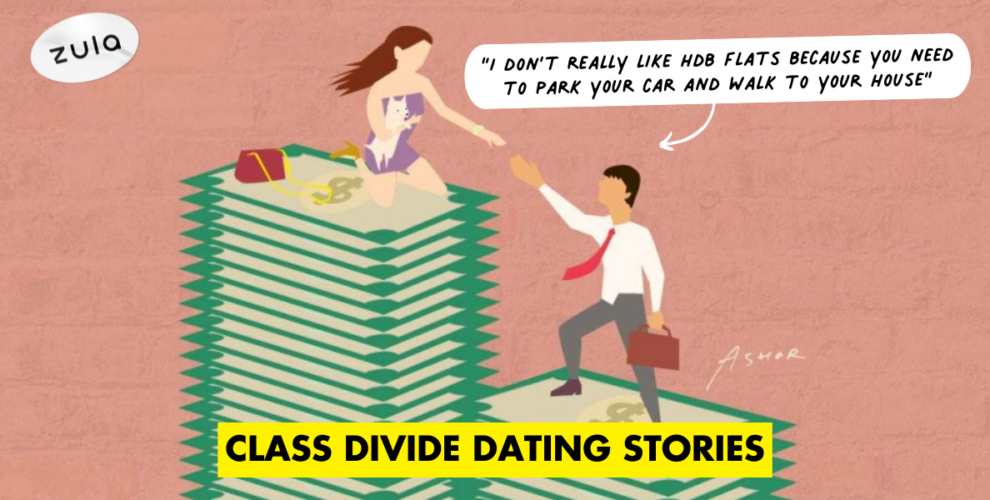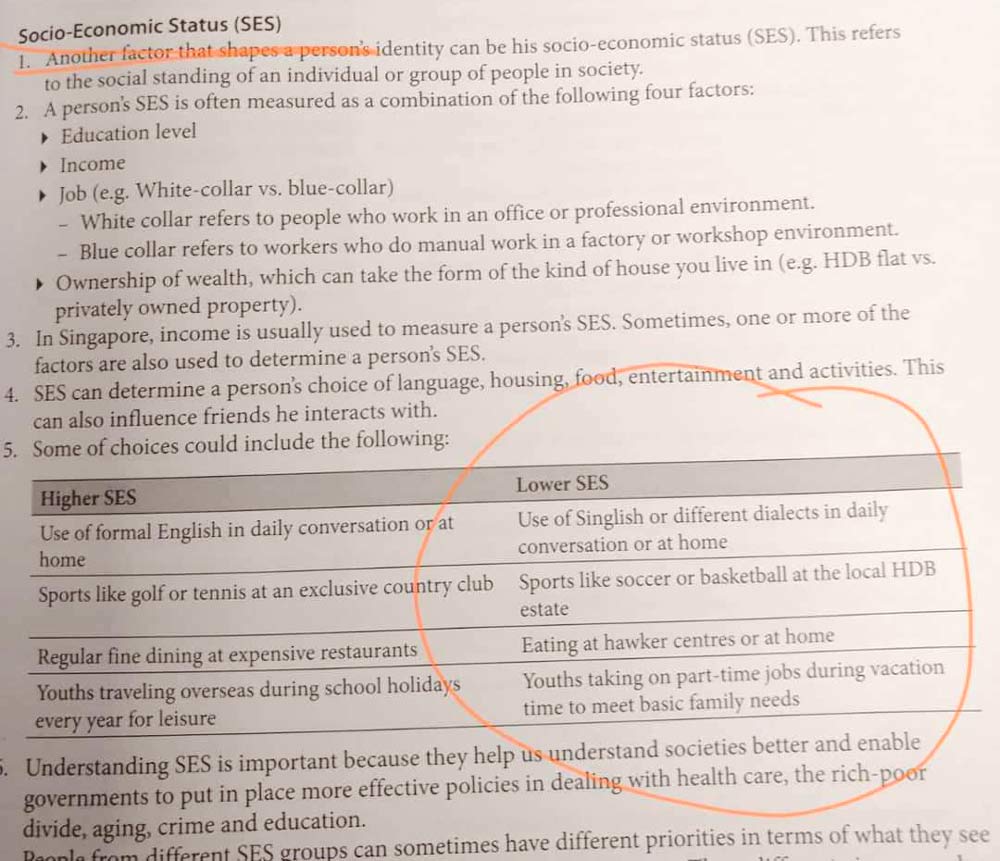Singaporean Class Divide Dating Stories
In 2018, an image of how this textbook portrayed class divide started floating around the internet.
There were netizens crying for the textbook to be burnt like witches in Salem. However, after interviewing Singaporeans regarding their experiences of class divide in dating for this story, it seems the socio-economic status (SES) table might ring truer than we would like to admit.
There is a gulf between the lower and higher SES parties in these stories that even Gandalf and his hobbits can’t seem to cross.
*Name changed to protect identities
Contents
1. No HDB, please
For the rich, a regular practice such as walking can feel like an inconvenience.
Chloe, 25, said, “My ex was from ACS Barker and lived in landed properties for most of his life. On the contrary, I’ve lived in a HDB flat my whole life. A few years into the relationship, I suggested we should start thinking about applying for a flat. He seemed reluctant, so I asked him why.
He sheepishly said, ‘I don’t really like HDB flats because you need to park your car and walk to your house.’”
2. The real-life Crazy Rich Asians tale
Singapore’s most talked-about movie last year was Crazy Rich Asians. To summarise, it was about a rich man’s mother disapproving of his not-so-rich girlfriend.
Spoiler alert: true love prevails.
Max*, 38, shared with me a real-life version of this story, “I have an in-law who is a house husband. His wife makes more than him so they decided that makes sense.
Unfortunately, every elder in their extended family looks down on him and ignores him during family gatherings. He tries to post minor victories in the family group chat to redeem himself from time to time, to no avail.
His wife’s father had told her, ‘If you marry him, I will not support you anymore.’
In contrast, her father bought a condominium for her brother who married an ‘approved’ spouse.”
No happy ending here.
3. The JB boy
Often, even love is unable to overcome the odds stacked against us.
Joanne, 23, explained, “I was dating a Malaysian guy a couple of years back. When I met his family and saw how he interacted with his friends, I realised his demeanour and way of looking at life were quite different from mine.
Whenever we discussed the type of home we wanted, I could tell that the differences in our dream homes reflected our differences in SES while growing up. The places I usually shop at would be places he goes only to buy gifts for special occasions.
He would usually go to pasar malams in JB, where he’s from. So whenever I went to places like ION, he wouldn’t buy much and sometimes wouldn’t want to come along because it incurred a lot of transport fees.
As a Christian, my parents also didn’t agree with me dating a Muslim, so we had to break up. There’s only so far a relationship can go if you don’t involve parents right?”
Also read:
4. Communication problems
Sometimes, communication goes beyond speaking the same language.
Hui Wen, 22, shared, “My ex came from the kinda family that speaks Chinese and Singlish, and he can’t really speak or write English well.
Our relationship ended because I felt like I couldn’t connect with him. Our education levels were quite different so he couldn’t connect to the type of topics I wanted to discuss. He constantly struggled to understand where I was coming from. I tried very hard to tell myself that it didn’t matter, but eventually I felt like our life goals were different, and our communication was very superficial.”
5. The disapproving parent #2
Class inequality can heighten insecurity in already unstable relationships.
“My ex was the breadwinner of the family. So he had no choice but to sign on so he could pay the bills,” explained Jamie*, 24.
“There were a lot of lifestyle differences. For example, luxuries like air con and his own room were something he didn’t have. I was very okay with paying for my share of the dates, and eating Maggi mee and at hawker centres instead of restaurants as I wanted him to save whatever money he could.
My mum didn’t force us to break up, but she was not a fan of [the relationship]. Because I’m close to her, I could tell. I would say my parents were just concerned; after all, they worked so hard to build a comfortable life for me, they wouldn’t want me to settle for anything less.
He couldn’t afford [to go to] university after polytechnic. He didn’t have a degree and people told him that he didn’t deserve me. This kinda fed into his insecurities and other issues that led to the breakup.
We broke up cos I felt emotionally drained from having to assure him that I wouldn’t leave him, and at that time, I was too young to realise what I was giving up. I am very sad it ended.”
6. I had to adjust to how the rich spent money
Like going to a new country, class divide can generate its own experience of culture shock.
Jessica*, 23, shared, “I’ve only dated two guys and both are significantly richer than me. I disagreed with my ex’s decision of selling his car after a few years. ‘Do you really need to upgrade to a Mercedes?’ I thought.
We fought about his lifestyle all the time, but I have learnt that it’s not my place to question their ‘rich man decisions’.
Recently, my boyfriend’s dad brought us out to a Chinese restaurant at Marina Bay Sands. He told us to order whatever we liked and the bill totalled $1,000. Obviously, that gave me a shock but it seemed like no big deal for their family.
During my birthday, my boyfriend’s mum asked me to pick a gift from Robinsons. I chose a Chanel perfume costing more than $100 because it was the only thing I wanted. She replied, ‘Huh? That’s all ah?’ And pushed me into a Coach store to buy more.”
Class Inequality Affects Dating In Singaporeans
Professor Teo You Yenn expresses in her book This Is What Inequality Looks Like that inequality is not just numbers and statistics.
“Inequality, as a social phenomenon, is experiential. It is a lived reality, felt in everyone’s everyday lives. These lived experiences tell us important things about how inequality is enacted and everyday reproduced.”
Love does not conquer all and definitely not socio-economic status, in many cases at least.
Cover illustration by Asher Mak.
This article was first published on 6 March 2019 and last updated on 3 March 2024.
Also read:








